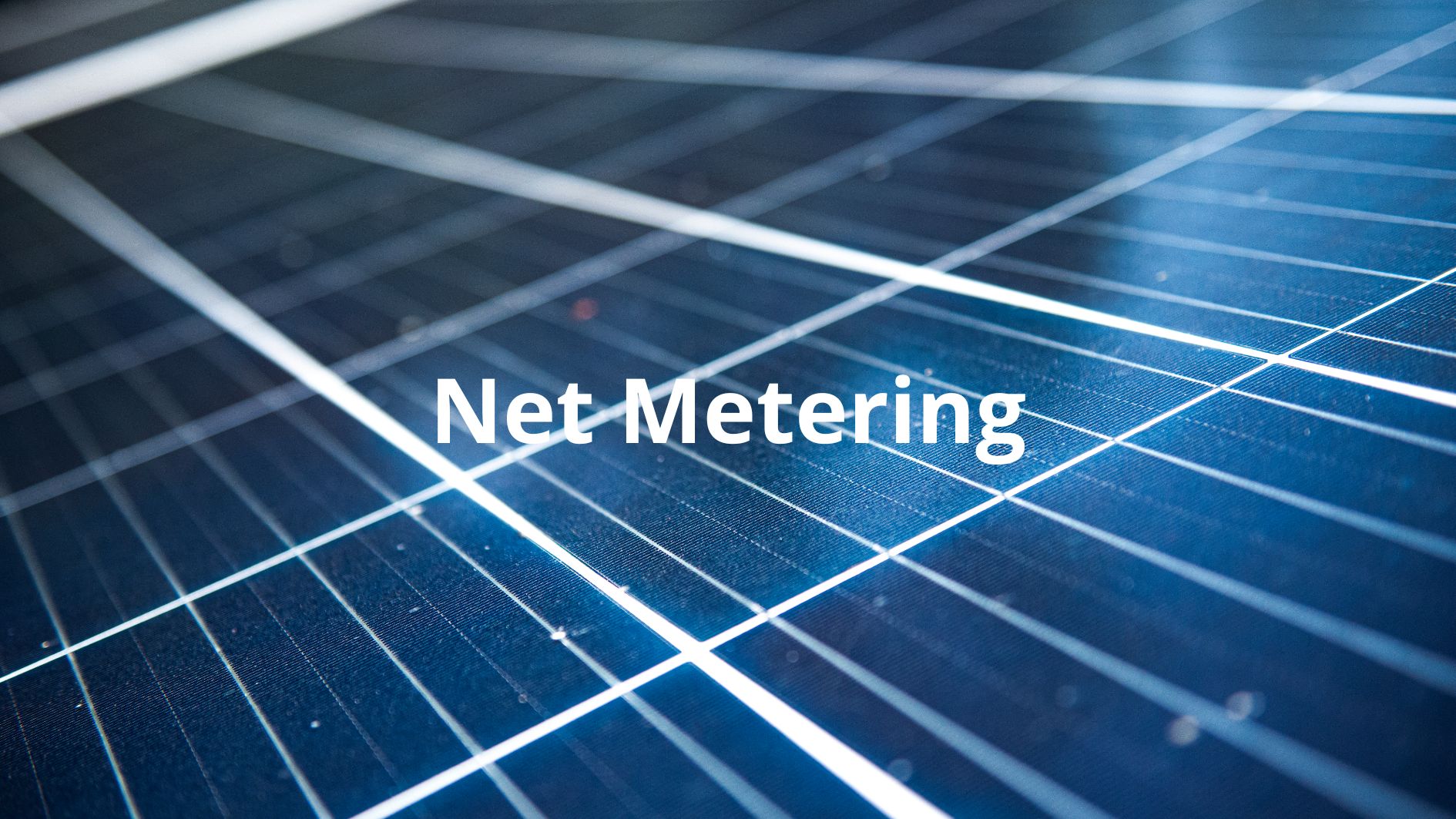Image source: Canva.com
North Carolina offers an average level of solar incentives, partly because some perks have recently expired and net metering has seen a few negative changes. While residential customers can still achieve significant savings on their systems, the savings won’t be as high as in some more solar-friendly states. On average, the available incentives should offset the system’s cost and save an additional $15,000+ over the life of the panels.
This is particularly beneficial because solar equipment in North Carolina tends to be more expensive than in most states. Although the cost per watt is lower, the larger system size requirements result in higher overall costs. These incentives help maximize energy savings and shorten the payback period for solar panel investments.
The Residential Clean Energy Credit
The Residential Clean Energy Credit, previously known as the Federal Investment Tax Credit (ITC), can reduce the cost of your solar panel system by 30%. This incentive covers the entire system, including equipment, labor, permitting, and sales tax.
To claim this incentive, you need to purchase your system with cash or a solar loan, as leasing does not qualify for the ITC. You must have a sufficient federal tax liability to use the credit, though any unused portion can be rolled over year-to-year until the ITC expires at the end of 2034. Direct payment of the ITC is only available to tax-exempt entities, such as nonprofit organizations.
Net Metering
In North Carolina, net metering underwent significant changes starting October 1, 2023, based on new tariffs approved by the North Carolina Utilities Commission. Key elements of these changes are as follows:
- Rider NM Closure: The previous net metering option, Rider NM, closed to new customers on September 30, 2023. Existing customers on Rider NM can continue with it until December 31, 2026, after which they will be moved to the new Rider NMB.
- Introduction of New Riders (Rider RSC and Rider NMB):
- Rider RSC (Residential Solar Choice): Now the primary net metering option, this rider includes a minimum monthly bill, non-bypassable charges for costs like storm recovery, and a grid access fee for systems over 15 kW. It also requires customers to use a Time-Of-Use (TOU) rate with Critical Peak Pricing. Energy exported to the grid is credited at the utility’s avoided cost rate.
- Rider NMB (Net Metering Bridge): Developed as an alternative for a limited number of customers each year, Rider NMB is similar to Rider RSC but does not require TOU with Critical Peak Pricing. Customers on this plan can remain on it for up to 15 years before switching to Rider RSC or a similar future plan.
These changes aim to ensure that net metering customers contribute fairly to grid costs, aligning with the requirements set by North Carolina’s 2017 legislation.

Net Metering: Your Guide to Solar Energy Billing
Solar for All
- The Southeast Rural Power: SFA Coalition (SE Rural Power Coalition), led by Groundswell, will launch and implement the Southeast Rural Power: SFA Program (SE Rural Power SFA Program). This initiative aims to deliver residential-serving community solar, energy storage to enhance community resilience, direct solar savings, energy efficiency improvements, and greenhouse gas emissions reduction for low-income and disadvantaged households. The coalition comprises eligible subrecipient nonprofit electric cooperatives and municipal utilities serving some of the most impoverished and energy-burdened communities in the Southeast. The program’s implementation strategy focuses on strengthening and transforming the residential solar market in the region by supporting new developers and installers with entrepreneurship resources, comprehensive project development and O&M support services, project financing assistance, and workforce development programs, including pre-apprenticeships and apprenticeships. It also includes community outreach and education initiatives. Headquartered in DC, Groundswell will operate its SE Rural Power Coalition program across eight states in the American Southeast.
- The North Carolina Solar for All Coalition (NC Coalition) will initiate a statewide EnergizeNC program to revolutionize solar expansion in the state, facilitating the swift deployment of distributed solar and associated storage with significant advantages for low-income and disadvantaged communities, including those on state- and federally recognized Tribal lands. Throughout the initiative, the Coalition will pursue four primary objectives: establishing a comprehensive program management strategy during a one-year planning phase, incorporating input from low-income and disadvantaged communities; mitigating greenhouse gas emissions, reducing energy expenses, and promoting environmental justice through the installation of rooftop solar in low-income single-family and multifamily residences throughout North Carolina; cultivating and empowering a skilled workforce to implement solar projects in all areas of the state, particularly in minority and Tribal communities; and conducting extensive community engagement efforts to ensure that the project’s benefits reach disadvantaged communities and individuals.
- The Clean Energy Fund of Texas (TxCEF), in collaboration with the Bullard Center for Environmental and Climate Justice at Texas Southern University (BCECJ), collectively known as CEFBC, is dedicated to deploying technical assistance, private capital, and grants to minority-serving institutions. Together, these organizations aim to facilitate the establishment of residential-serving community solar projects in low-income and disadvantaged communities that face significant challenges related to energy policy and grid vulnerability. These projects are anticipated to result in emissions reductions, savings on household utility bills, generation of shared revenues through community ownership, and the mobilization of private capital.
- Teaming up with lead applicant GRID Alternatives, a coalition of ten mission-driven nonprofit solar and affordable housing providers and allies has collaborated to develop the Solar Access for Nationwide Affordable Housing Program (SANAH). SANAH is meticulously crafted to maximize benefits for households and communities while advancing equity, reducing harmful pollution, and combating climate change.
The program offers a multitude of advantages, including expanded access to solar and storage for income-qualified households, significant energy savings and relief from burdensome costs, as well as additional benefits like efficiency improvements and electrification.

Solar for All
Property Tax Abatement for Solar Electric Systems
Property Tax Abatement for Solar Electric Systems typically refers to a financial incentive offered to homeowners or businesses who install solar electric systems (photovoltaic or PV systems). This incentive allows them to reduce their property taxes by a certain amount based on the value of the solar system installed. The aim is to promote renewable energy adoption by reducing the financial burden on property owners investing in solar energy.
Piedmont Electric Member Corporation Renewable and Solar Energy Loan Program
The Piedmont Electric Corporation offers a variety of incentive programs to assist homeowners and business owners in adopting green energy solutions. One such program is a home upgrade loan, which provides financing for the purchase and installation of solar water heaters and solar panels. Approved customers can borrow up to $30,000 for a term of ten years.
Additionally, the company offers the Solar Energy Systems Tax Credit. This credit is available to owners of solar water heaters and solar panels, provided that at least half of the system’s generated energy comes from the sun and the system is certified by the Solar Rating and Certification Corporation (SRCC).
Randolph EMC – ElecTel Energy Efficiency Loan Program
The ElecTel Energy Efficient Loan program offers accessible financing for residential property owners to enhance their homes’ energy efficiency. The program is available to owners of single-family homes, duplexes, mobile homes, and owner-occupied condos and includes the following features:
- Low Fixed Interest Rates: Starting as low as 4.9%.
- Up to 100% Financing: Covers the full purchase price, including taxes and installation costs.
- Flexible Payment Terms: To fit various financial situations.
- Loan Limits: Up to $35,000 (or $5,000 for mobile homes).
This loan can finance various home energy improvements, such as efficient windows and doors, electric heat pumps, furnaces, air conditioners, solar projects, insulation, and ENERGY STAR appliances.
Duke Energy – PowerPair
The new PowerPair incentive for residential solar and battery customers offers both upfront and ongoing incentives based on system size and rate structure. Customers can receive up to a $9,000 rebate to help offset the installation cost of solar and batteries. For solar panels, there is a $0.36/watt incentive, capped at $3,600 per residence with a maximum installation capacity of 10kW. For battery storage, there is a $400/kWh incentive, capped at $5,400 per residence with a maximum installed capacity of 13.5 kWh. Only newly installed systems are eligible for these incentives; previous solar customers adding battery storage are not eligible. Systems can exceed the stated incentive capacity, but the incentive will only apply to the portion of the system under the cap.
Discover the Ideal Solar System for Your Home in Just a Few Clicks!
Disclaimer
The information provided herein is for informational purposes only and is accurate as of the time of publication. Please be aware that the solar energy landscape, including technology, regulations, incentives, and market conditions, changes frequently. Therefore, it is essential to consult with qualified experts and professionals before making any decisions regarding solar energy installations or investments. This will ensure that you receive the most current and applicable advice tailored to your specific circumstances.





